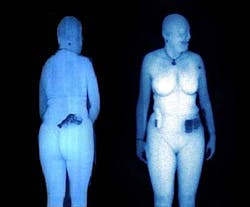TSA Stops Using 'Nude Scanners'
June 03--The "nude scanners" are gone.
The full-body scanners that used X-rays to create what look like nude images of passengers have been packed away and removed from airports across the country. The 250 or so machines were removed about two weeks ago, before the June 1 deadline set by Congress.
But privacy advocates aren't satisfied, noting that the Transportation Security Administration is still using full-body scanners that employ a different technology.
"They've never made a case that these scanners are better than using metal detectors or swabs to detect the use of explosives," said Marc Rotenberg, executive director of the Electronic Privacy Information Center, a research center that sued the TSA in 2010 over the use of all full-body scanners.
The TSA now relies solely on millimeter-wave scanners, which previously generated similar nude images but have been upgraded to portray a generic figure on which they point out objects concealed on travelers' bodies. The scanner is made by L-3 Communications Holdings Inc. of New York.
The X-ray scanners made by Rapiscan Systems in Torrance were removed after Congress required all airport scanners to use privacy-protecting software, such as the technology used by L-3. Rapiscan did not create the software for its X-ray scanners.
Rotenberg said he worries that the L-3 scanners may also be creating and keeping digital images of passengers. "There are lingering questions about whether the millimeter-wave devices are retaining images," he said.
A TSA spokesman said the scanners are programmed not to retain digital images.
--TSA chief still backs allowing small knives on planes
Transportation Security Administration chief John Pistole has delayed a plan to let passengers carry small pocketknives on planes for the first time since the Sept. 11, 2001, terrorist attacks.
But it is clear from a speech he gave last week at George Washington University that he still supports allowing knives on planes.
Pistole delayed the change, initially scheduled to take effect April 25, after hearing concerns from a panel of airline industry representatives, including pilots and flight attendants.
But in his speech at the university, he said, "It is the judgment of many security experts worldwide, a judgment with which I agree, that a small pocketknife is simply not going to result in the catastrophic failure of an aircraft."
In contrast, he added, "an undetected and successfully detonated improvised explosive device will."
Pistole noted that the United Nations' International Civil Aviation Organization adopted a policy in 2010 allowing passengers to carry knives with blades 6 centimeters in length or shorter on commercial planes.
Since then, Pistole said, billions of commercial airline passengers around the world have been allowed to carry such knives on foreign carriers without a reported security incident involving knives.
--Americans are second to German in tipping
So much for the U.S. travelers' reputation as the "ugly Americans."
Americans are second only to Germans in the rate at which they leave tips at hotels and restaurants, according to a survey of more than 9,000 travelers in eight countries by the travel website TripAdvisor.
When asked how likely they are to tip, 69% of Germans say they always tip, compared with 57% for Americans, 53% for Russians, 40% for Brazilians and 39% for the French and British. Italians came in last with 23%, behind Spanish at 36%, according to the survey.
The top three reasons Americans tip are when staff at restaurants or hotels is helpful, friendly or polite, the survey found.
Copyright 2013 - Los Angeles Times
